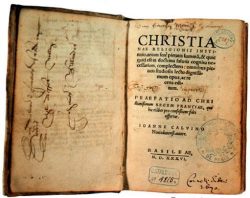The Institutes
of the Christian faith
The major work by Jean Calvin, which he never stopped modifying. During his lifetime 25 editions were successively published, in which he defined his theological ideas.
The title
The word “institutes” derives from the latin “Institution” which means instruction. In 1516, Erasmus had published the Institution of the very Christian Prince.
Jean Calvin’s Institutes was essentially a textbook for Christian education.
The first edition in 1536
The first edition was published in Latin in Basel (Switzerland). In the foreword to the French king François I, Epistle to the king, Calvin claimed that the Protestants were good Christians who did not mean to contest the King’s power.
The first edition comprised six chapters in which Calvin reworked on Luther’s notion of free salvation, and explained the main characteristics of the christian faith, i.e.the decalogue, the credo, Our Father and the sacraments of which he accepted only two, as Luther did, namely baptism and the Eucharist.
In the more personal last chapter “Christian freedom” Calvin dealt with the city’s organisation and also split the civilian government in three parts :
- The magistrate or civil authority, defender and keeper of the laws,
- The law,
- The people governed by the laws and law abiding.
One exception to the obedience to the magistrate was allowed when his legislation was against God’s laws. Calvin advocated passive resistance.
Young Calvin’s intuitions concerning the city were to be present throughout his work with very few and minor modifications.
Further editions
The 1539 edition comprised seventeen chapters in a quite different order. The first chapters dealt with God, and Man. Whereas Luther’s mind was focused on Jesus Christ, Calvin’s was on God. The Latin expression “soli deo gloria” (glory to God alone) summed up his opinion. The following chapters dealt respectively with faith, confession of faith, penitence, justification through faith, the relation between the Old Testament and the New Testament, and predestination-providence.
The predestination doctrine is definitely linked to Calvin. However he did not invent it, but found it in Saint Augustin’s texts. It cannot be parted from the notion of free salvation. For Calvin if God alone controls salvation, he must be the one who chooses the elect and the rejected. Calvin says that predestination is a logical consequence of free salvation. It exemplifies the priority of divine initiative.
The subsequent chapters dealt with the sacraments. The Eucharist was controversial not only with the Catholics, but among reformers. Luther and Zwingli had violent arguments even though they both refused the catholic dogma of transubstantiation.
Zwingli said that Christ was spiritually present in the bread and wine in the Eucharist, whereas Luther said Christ was actually present in the bread and wine.
Calvin rejected the Real presence of Christ in the bread and wine. He said that Christ took part in this community meal through the faith of the believers.
The last chapters dealt respectively with Christian freedom, ecclesiastical power, civil government and Christian life.
Calvin differentiated ecclesiastical power and government. He refused the meddling of magistrates with religious debates. Contrary to a widespread opinion, Geneva was in no way a theocracy in the XVIth century. But, thanks to Calvin, the church gained some autonomy from the state, and this fact enabled him to continue despite the state’s occasional hostility.
In « The Epistle to the King » (l’Épître au roi), addressed to François Ier – to whom he had dedicated “The Institutes of the Christian Religion” – Jean Calvin wrote:
« Quelle chose convient mieux à la Foy, que de nous recongnoistre nudz de toute vertu, pour estre empliz de luy ? Vuids de tout bien, pour st empliz de luy ? Serfz de péché, pour estre délivrez de luy ? Aveugles, pour estre de luy illuminez ? Boyteux, pour estre de luy redressez ? Débiles, pour estre de luy soustenez ? De nous oster toute manière de gloire à fin que luy seul soit glorifié et nous en luy ? »
(What is more proper to faith than that we should recognise ourselves naked of all virtue in order to be clothed by God? Empty of all good, in order to be filled by him? Enslaved to sin, in order to be freed by Him ? Blind, in order to be enlightened by Him? Lame, in order to stand upright by Him? Fools, in order to be upheld by Him? Deprived of all glory, so that He alone may be glorified and we in Him?)
Bibliography
- Books
- CALVIN Jean, Institution de la religion chrétienne, Éd. J.D. Benoit, Paris, 1957-1963, Volume 5
Associated tours
-
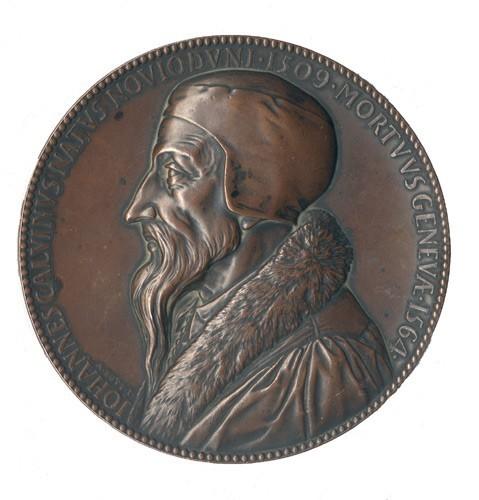
Jean Calvin
With the publication of his book: The Institution of the Christian Religion, Jean Calvin establishes himself as the main theologian of the Reformed current. He was called to Geneva, which...
Associated notes
-
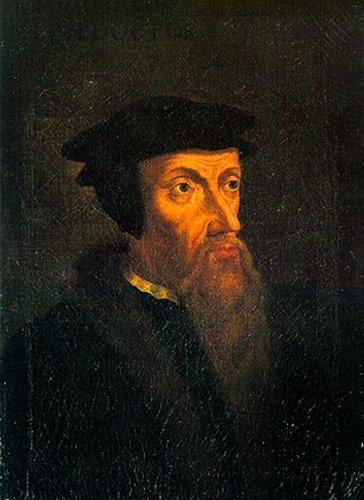
Jean Calvin (1509-1564)
A generation after Luther, the Frenchman Jean Calvin became the organiser of the Reformation : he organised the Church, shaped the doctrine and defined the role of the Church in state government. -
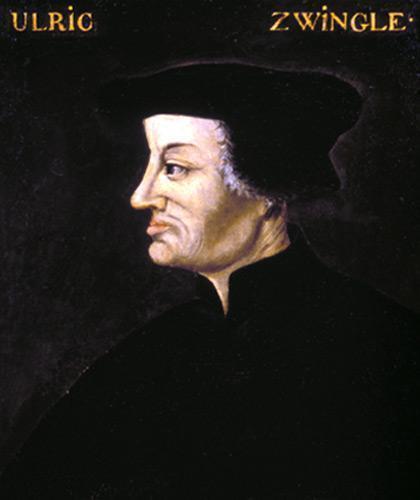
Ulrich Zwingli (1484-1531)
Zwingli, a pastor and theologian, based the Reformation on Bible study. In his opinion the Reformation comprised fighting social injustice. -
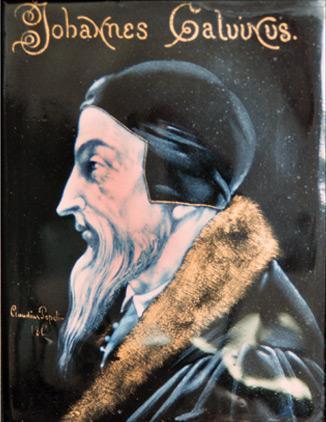
Jean Calvin's doctrine
Calvin presented his doctrine in his major work : The Institutes of the Christian Religion. -
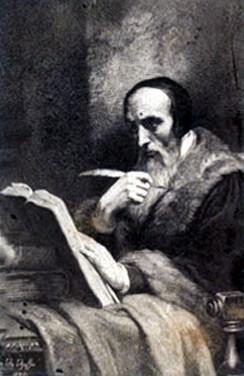
Calvin at work
Calvin was an tireless worker. -
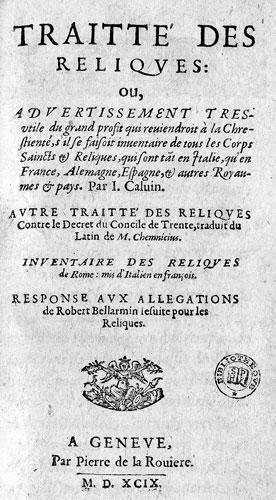
A Treatise about relics of Jean Calvin (1543)
-
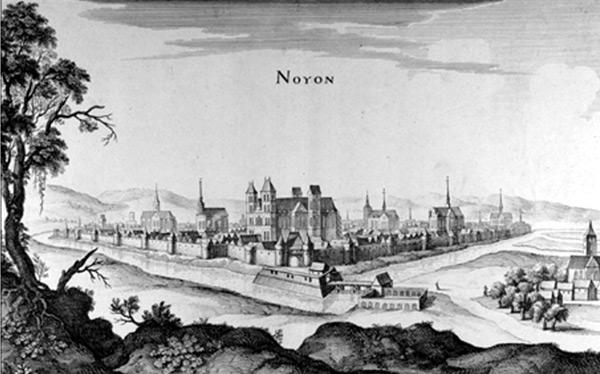
The places where Calvin lived

